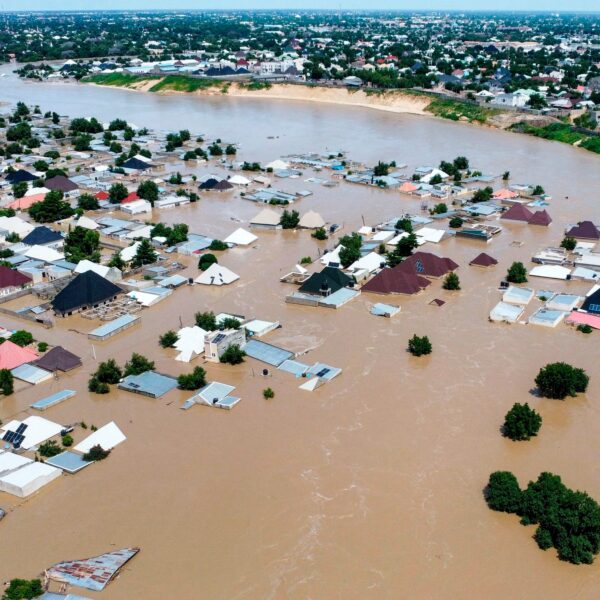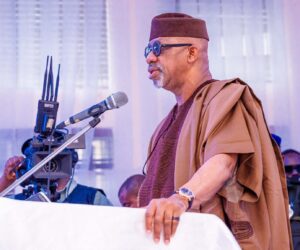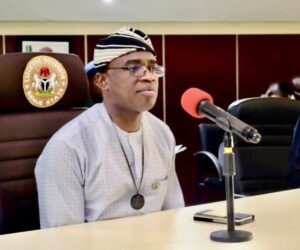As thousand of lives and properties are destroyed and submerged or lost due to the high-surging and ongoing flood disaster in Nigeria and Africa at large. The most vital questions remains here are : what are the measures and actions can we take to end this crisis? Are we going to fold our hands and continue seeing our houses and people dying because of the flood? Or should we keep witnessing this calamity and flood disaster? What efforts and measures has the government taken so far? And have their actions yielding positive outcomes? If the answer to these questions is No, citizens, residents, and the government in general must re-strategise against flood-related matters in order to tackle it seamlessly and permanently in Nigeria.
According to the 2025 Annual Flood Outlook (AFO) 1,249 communities in 176 local government areas in 30 states and the Federal Capital Territory (FCT) fall within the high flood risk areas.
The report added that high-flood-risk states are Abia, Adamawa, Akwa Ibom, Anambra, Bauchi, Bayelsa, Benue, Borno, Cross River, Delta, Ebonyi, Edo, Gombe, Imo, Jigawa, Kebbi, Kogi, Kwara, Lagos, Nasarawa, Niger, Ogun, Ondo, Osun, Oyo, Rivers, Sokoto, Taraba, Yobe, Zamfara and the FCT.
Unfortunately, Oyo, Kano, Edo and Borno states have started experiencing floods this year. After the flood hit some communities in two local governments in Borno state, comprising Chibok and Damboa, the Acting Manager Ali Abdullahi Isa, of the Borno State Emergency Management Agency (BOSEMA) stated and I quoted him.
“As directed by His Excellency, the Executive Governor of Borno State, Prof. Babagana Umara Zulum, we have carried out an on-the-spot assessment of all the areas affected by the flash flood in the two local governments. A total of 1,103 houses in Gumsuri, Wovi, and Garjang in Damboa LGA have been severely affected, while 106 houses in Mboa, Whuntaku, and Yarchida villages of Chibok Local Government were also affected”.
Even though, floods this year have become a global concerns, with incidents reported in the USA, including Texas, where about 51 lives were lost and some still missing.It is imperative for the government in Nigeria to take precautions and measures to tackle them.
However, we all had the most painful and unforgettable experiences of the disaster in Nigeria, specifically the Maiduguri flood and Makwa flood, which have taught us lessons that the government, citizens, and stakeholders must learn from to avoid and prevent further occurrences. We must use these bad memories to avert the reoccurrence of such disasters, which claimed over 300 and 200 lives and affected many souls.
It’s for these reasons I’m calling on the federal government to declare a total national emergency on floods – this will allow the government to actively respond to the crisis effectively; resources should be allocated for this disaster, enabling the government to support those displaced as a result of the flood.
Undoubtedly, Declaring a national emergency on flood- would allow the government to focus on fixing the bridges and dams that have broken or collapsed in the past, which are capable of causing water to wash over communities and lead to flash floods across the country.
Furthermore, the number of victims affected by the flood is increasing, with no specific measures in place to mitigate the situation permanently; hence, declaring a state of emergency is necessary to address these flood-related issues.
According to the United Nations Office for the Coordination of Humanitarian Affairs (OCHA), over 1,000 people were killed and 740,000 displaced by floods affecting 5 million in Africa, as reported last year.
While declaring a national emergency, a high-powered committee needs to be inaugurated by the federal government in collaboration with the National Emergency Management Agency (NEMA) and State Emergency Management Agencies in all 36 states to extensively discuss ways to address the issue. The committee should comprise Nigerian Meteorological Agency (NiMet), NiMet traditional rulers, community leaders, and government officials to deliberate on the issue permanently.
Additionally, the committee’s responsibilities should include providing a comprehensive list of all dams and bridges in the country that might cause flooding and reporting to the federal government. After submitting the report, the government should fast-track actions to repair these structures within a short period to avert further escalation of floods in the country.
If a global concerns like the coronavirus and Ebola virus can be addressed within a short period of time ; then flood concerns can also be tackled to protect citizens. While I’m fully aware it’s not easy to address it due lack preparedness and in some states, houses have been built in waterways, the government shouldn’t fold its hands.Actions are necessary, and the government should ensure that no houses or markets are built in waterways going forward.







